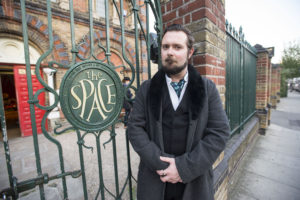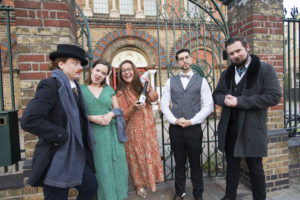Recently appointed Deputy Director of the Space, Matthew Jameson is collaborating with Storyfleas to bring The Play at Eight: The Monkey’s Paw to the Space. Directing and taking a performance role of ‘The Director’.
What about W.W Jacobs short story ‘The Monkey’s Paw’ inspired you to create this piece of theatre?
I was reading submitted scripts for Plays Rough London (a new writing collective that I’m a co-founder and producer for) seeking pieces of work that could be performed in ‘sightless or soundless’ way. And this was one that I immediately loved, it was so well observed, the language was beautiful and it was ripe for potential staging.
In pairing this short script with a cast and team, we first had a drop out of an actor, so I joined as a narrator, then the director dropped out a week before the show, so I turned it into a loose collective collaboration with me making the final calls.
It started as a 20 minute radio play homage, Jack and Sara saw what I’d done with that and wanted to take it further, which I happily agreed with!
 ‘The Director’ getting his obligatory Space gates photo.
‘The Director’ getting his obligatory Space gates photo.
Tell us a bit about the relationship you, as director, had with both Jack and Sara during the creative process.
We have a really good relationship, it’s creatively very close and much less formal than many others I’ve worked with. Between my work at the Space and setting up the show in my own time it’s been a bit mad but Jack & Sara are so resourceful and energetic. We’re also running the producing side of things ourselves, Jack and I are taking performance roles and Sara has been planning our marketing with Keri (from Wonderpup Media). They help me expand on any points with the actors I get a bit muddled on and I give them nods or nudges in a staging or dramaturgical point of view, but there’s no sense of preciousness from anyone and we always leave meetings laughing.
How did the idea to use the form of a radio play within a play come to light and how has it impacted the production?
When I read the short script, everything sounded as if it was written to be read by Orson Welles and plummy 30’s/40’s actors, the narrator was named ‘HOST’ and there was special denotation and attention given to sound effects. Jack & Sara never made it explicit, but subconsciously I think it was all there.
I think the idea of the 30’s is what really spurred on the momentum to flesh out the world, we explored an earlier draft of a modern podcast, but there was something more visceral and theatrical about that period.
The hardest bit has been splitting the ‘studio’ world and the ‘radio’ world but keeping the play in one piece, they have two very different energies, paces and styles of acting needed, so it’s a challenge that we’re having fun figuring out.
 Orson Welles, a radio maverick with an ‘interesting’ personal life
Orson Welles, a radio maverick with an ‘interesting’ personal life
A review from London Theatre Marathon mentions the use of a blindfolded audience. How do you feel the removal of their vision impacts their experience of the play and is this an aspect you’re keeping for your shows at The Space?
It really heightens the drama and sensory experience that an audience has. In many ways it super simplifies your job as a director too, you just have to worry about sound instead of facial expressions, body language, aesthetics etc. And there’s a lot more room for imagination with making sounds, which is what drew me to the Foley aspect. I love making strange equivalents from familiar tools and equipment, my soundtrack growing up was the guitar work of Tom Morello [Rage Against The Machine, Audioslave, Street Sweeper Social Club] who made a guitar sound like anything that wasn’t a guitar, so this has been a great chance to experiment in a similar way.
We’re going to limit how much an audience can see of our radio play sections (WITHOUT blindfolds), but you can’t expect us to give away all our secrets.
You have said that you like the ‘clever use of sound and humour’ in storytelling, how has this been created and developed in the rehearsal room?
With the ‘sound’ element, we show our working in the performance, so I won’t give any spoilers, but luckily Foley artistry is such an extensive and comprehensive discipline that most of what we’re after has been found and made 10 times before by those much more clever than we.
Finding ‘humour’ is harder, as the more we looked at the original text, the more it became clear that there are some elements that haven’t aged very well. So we’ve had to lean into that side of things, incorporating a lot of genuine 30’s marketing and copy, examining our national mindset at the time and bringing elements of satire, purely by observing and being faithful to how absurd the times were.
To get the belly laughs in, we’re lucky with our writers and performers. We’ve got writers who are both incredibly observant and who have a great turn of phrase and sense of mischief. Our performers are great, Becky [Coops – Playing Dick Everett, the male lead] said yesterday “Take the work seriously, but not yourself seriously in your work” which really struck me as the perfect balance, she’s interrogating the character to find truth, but not afraid to be ridiculous in performance.
What do you hope to be the future plan for ‘The Play at 8: The Monkey’s Paw’ and ‘Storyfleas’?
I’d love to do it in a site specific setting, somewhere like a genuine radio studio/sound stage. As it is my first time working with Storyfleas I’d love to work with them again, they’ve got so many cool ideas and concepts!
If you were given the monkey’s paw with no consequences, what three wishes would you ask for?
Oh no, I’m not falling for that one. There’s ALWAYS a consequence!
 The Storyfleas team at our Autumn/Winter Season Launch
The Storyfleas team at our Autumn/Winter Season Launch